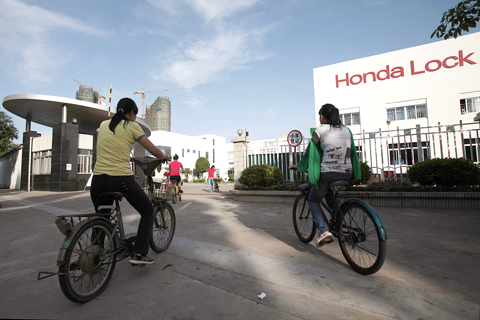Toyota Motor Corp stopped production at its main factory in China after a strike at its plastic parts supplier, the carmaker said yesterday, the latest in a series of labor disputes across the country.
Toyota said its factory at Tianjin, near Beijing, stopped production midway through the day on Friday.
Company spokeswoman Ririko Takeuchi said the Tianjin Toyota plant, with three assembly lines and a combined annual production capacity of 420,000 vehicles, was closed for the weekend and plans for resuming production tomorrow depended on securing steady supplies from strike-hit parts maker Toyoda Gosei.

PHOTO: REUTERS
Two walkouts have hit the parts supplier for Toyota. Workers at the Toyoda Gosei plant, also in Tianjin, said late on Friday the strike disrupting supply lines was still on.
However, workers at a Honda auto parts plant in southern China showed up for work yesterday apparently ready to accept a new pay deal to resolve a week-long strike.
The new Honda deal was emerging after days of difficult talks between worker representatives and management. It failed to yield any further raising of base salary levels from a 200-yuan (US$29) wage hike already offered and rejected by striking workers last weekend.
Despite the apparent setback, many workers at the Honda Lock plant in the Pearl River Delta town of Zhongshan appeared ready to accept the terms and put the strikes behind them.
“We’re tired of all this tension,” said one young factory girl who was among hundreds streaming to work at the Honda plant. “We just want to go back to work and see what happens.”
While Honda Lock has not yet confirmed the fresh offer, one worker source said that worker representatives negotiating on their behalf had accepted this “final deal.”
Notices of the new deal were posted up inside the factory, workers said, announcing a 200-yuan rise in base salary levels and an 80-yuan rise in housing benefits.
A Honda Motor spokeswoman said yesterday a strike hit a factory affiliate Nihon Plast Co in Zhongshan on Thursday and supply was temporarily disrupted.
Honda said production at the factory, which makes plastic parts such as steering wheels, had resumed on Friday but that negotiations between workers and management were still going on. Car production was not impacted.
The Nihon Plast factory also supplies steering wheels and airbags to Nissan Motor Co but a spokesman at Nissan said there had been no impact on its car production.
China’s commerce minister shrugged off concerns that recent labor unrest in the so-called “workshop of the world” will scare investors away, state media reported yesterday.
“A small proportion of the contracts may be transferred to countries with lower costs but China has yet to lose its labor cost advantage,” Chinese Minister of Commerce Chen Deming (陳德銘) was quoted as saying by the official China Daily newspaper.
Chen told Hong Kong-based Phoenix TV that the recent strikes were “isolated cases.”
“We want to ensure workers get an appropriate wage increase but also want to pay attention to the capacity of enterprises to bear the burden [of rising personnel costs].”

With an approval rating of just two percent, Peruvian President Dina Boluarte might be the world’s most unpopular leader, according to pollsters. Protests greeted her rise to power 29 months ago, and have marked her entire term — joined by assorted scandals, investigations, controversies and a surge in gang violence. The 63-year-old is the target of a dozen probes, including for her alleged failure to declare gifts of luxury jewels and watches, a scandal inevitably dubbed “Rolexgate.” She is also under the microscope for a two-week undeclared absence for nose surgery — which she insists was medical, not cosmetic — and is

GROWING CONCERN: Some senior Trump administration officials opposed the UAE expansion over fears that another TSMC project could jeopardize its US investment Taiwan Semiconductor Manufacturing Co (TSMC, 台積電) is evaluating building an advanced production facility in the United Arab Emirates (UAE) and has discussed the possibility with officials in US President Donald Trump’s administration, people familiar with the matter said, in a potentially major bet on the Middle East that would only come to fruition with Washington’s approval. The company has had multiple meetings in the past few months with US Special Envoy to the Middle East Steve Witkoff and officials from MGX, an influential investment vehicle overseen by the UAE president’s brother, the people said. The conversations are a continuation of talks that

Nintendo Co hopes to match the runaway success of the Switch when its leveled-up new console hits shelves on Thursday, with strong early sales expected despite the gadget’s high price. Featuring a bigger screen and more processing power, the Switch 2 is an upgrade to its predecessor, which has sold 152 million units since launching in 2017 — making it the third-best-selling video game console of all time. However, despite buzz among fans and robust demand for pre-orders, headwinds for Nintendo include uncertainty over US trade tariffs and whether enough people are willing to shell out. The Switch 2 “is priced relatively high”

Alchip Technologies Ltd (世芯), an application-specific integrated circuit (ASIC) designer specializing in artificial-intelligence (AI) chips, yesterday said that small-volume production of 3-nanometer (nm) chips for a key customer is on track to start by the end of this year, dismissing speculation about delays in producing advanced chips. As Alchip is transitioning from 7-nanometer and 5-nanometer process technology to 3 nanometers, investors and shareholders have been closely monitoring whether the company is navigating through such transition smoothly. “We are proceeding well in [building] this generation [of chips]. It appears to me that no revision will be required. We have achieved success in designing